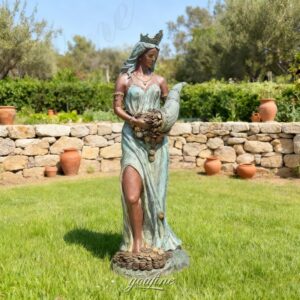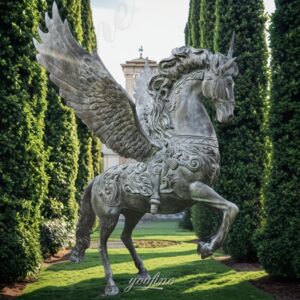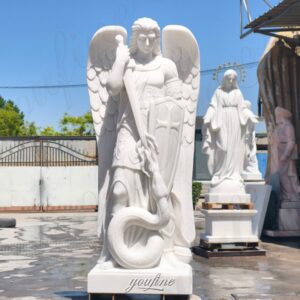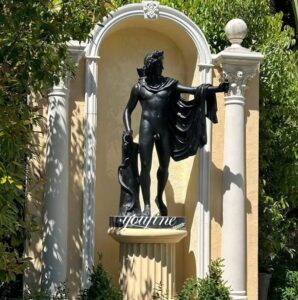In the animal kingdom, the lion is at the top and, according to some cultures, the king of the jungle. Due to its majestic nature and demeanor, it has become a symbol of art, iconography, myths, and more. The most common mythological representations we see are as a winged lion prevalent in many cultures. While in many cultures such as Persian, Mesopotamian, and Egyptian, it is also called the griffin, today we will discuss what the lion statue actually symbolizes and why it has been so fascinating.
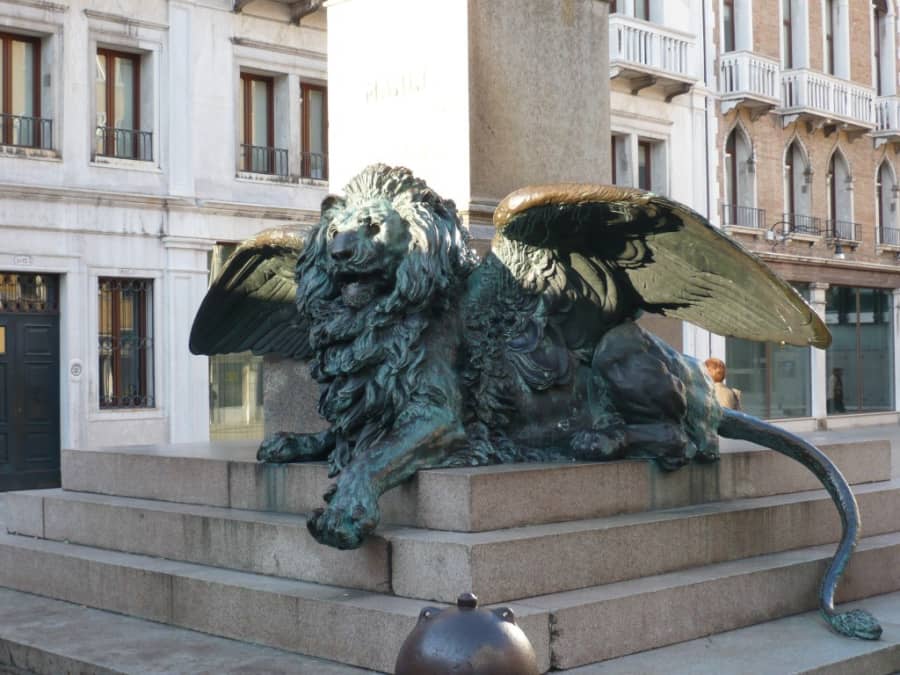
1. What is a Winged Lion Typically Called?
A griffin is a mythical creature with the lower body of a lion with wings and the head of an eagle. Sometimes it will have the head of a lion with wings instead of an eagle or a man. No matter the combination, the lion’s body represents the mystery and strength of Earth, while the head of the eagle and its wings portray the wisdom and freedom of the sky. You would see this symbology in Egyptian culture and somewhat the Mediterranean region.
With its popularity in the 14th century in Asian regions and later Greece, the symbolism instilled hope, beauty, and power due to wings and style strengths. Most of this era’s architecture is at the front of a building, commonly beside the stair front or on pillars.
Origin of the Myth
You typically won’t find the actual origin of when the winged lion was used as a symbol for art and statues. In some writings, the Levant was provided the origin in the 2nd century BC, and due to trade and conquests, the winged lion spread across the world.
An Icon That Spans Centuries
Winged lion has been linked with different symbolic nature in different eras and cultures, but there is more to it in history. Similar to what we said in the origin above, in some writings, it has been known as the emblem of Serenissima.
It started with a lagoon city and its municipality of Veneto region, part of the Serenissima Republic. Furthermore, it was also found in the coat of arms of the Italian navy, especially the merchant navy that represented the Italians in those times.
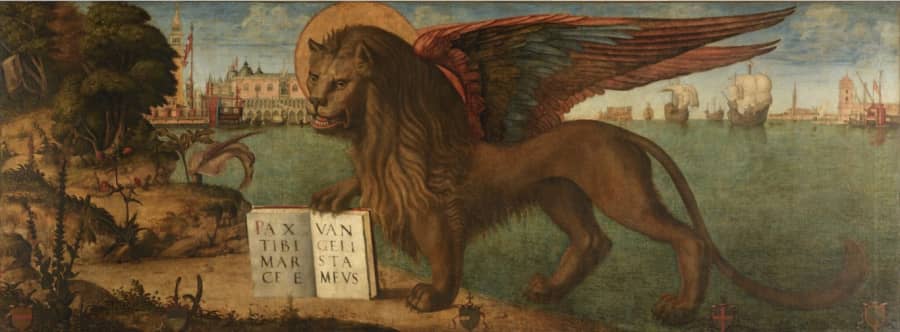
This history is evidenced in historical buildings or squares in many Italian cities. These cities were conquered or dominated by Serenissima and hence brought this symbolism.
In another legend, the winged lion coming to Saint Mark in his dream and motivating his later adventures was later handed down to other generations. Based on these hand-me-down traditions and legends, the first Basilica in Alexandria was dedicated to him.
2. What Does a Winged Lion Symbolize?
One of the most famous symbolizations of Venice traditionally represents the patron saint, the evangelist. In some cases, it also has been linked to St. Mark, where the wings aren’t as big but smaller and more significant than a lion’s regular size. This is the overall information of popular belief, but here are some detailed symbolization meanings.
Saint Mark’s Symbol
In the early centuries of Christianity, the four evangelists had creatures that represented them in tradition. The winged lion belonged to Saint Mark, famously known for his written work on the New Testament in the Gospels. In one of his gospels, he began with a famous phrase, “crying out in the wilderness,” which has been attributed to him. This phrase, or the beginning of the gospel, has been related to a roaring lion with wings.
In another Christian legend, the winged lion helped Mark while traveling to Alexandria, where he had to take shelter in a fishermen’s hut during a heavy storm. There in his dream, the winged creature enabled and motivated him to rid Alexandria of disbelievers and make it one of the biggest centers of Christianity.
Symbol of Courage and Power
The lion with wings is a majestic and strong creature that also symbolizes strength and courage, even if you consider its predominance in the animal kingdom. It further signifies sovereignty from the king of the jungle. Because of these concepts, people have associated a lion with kings and monarchs of old, facilitating the right to rule being divine or majestic. This majestic or divinity significance is because of the winged part of the lion and becomes more mystical than most.
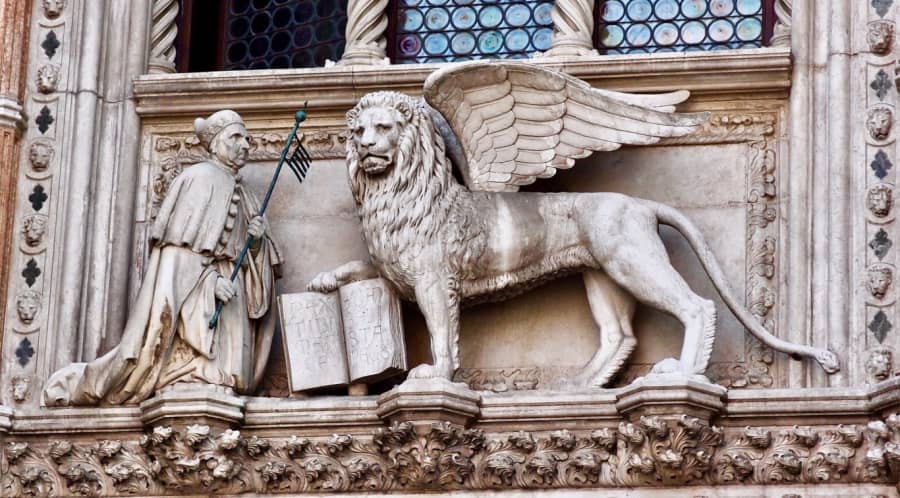
Symbol of Venice
You can find the winged lion in Venice, Italy, in different depictions holding a book in some cases while, in others, a sword. This slight variation presents it as a symbol of power yet the city’s diplomacy.
The symbol’s most prominent representation is the bronze winged lion statue in San Marco Piazza, which sits on the top of granite columns. These columns are part of the city square, where you can also see other symbols of different patrons.
If we look back at Venice’s history in the middle ages, specifically the 9th century, it had been the center of the Christian faith since the birth of Christ. Now due to its prominent position between the Byzantium and Holy Roman Empire, it had its part to play for influence. The best way to do that was by holding a relic of immense power, and Saint Mark’s lion was the big one among the winged lions. Not just for power, it was held dearly in the hopes of uniting the masses through it as a unifying symbol.
The unfortunate thing is that the statue has been under restoration in different eras, as seen from different pieces of bronze, and repair work can be seen easily. According to different historians, the original might have been quite different from what it is now.
Symbol of Numerous Myths
In Persian, Assyrian, and some other cultures, you can find mentions and statues of winged lions. Specifically in Persian culture, Zoroastrianism is associated with lion with wings creatures because of the concept that it is a guardian culture to protect their faith.
Symbolism in Alchemy
Here you will find mention of substances and their volatile and elusive nature in the concept that you need to tame this volatility, especially of the elements.
3. Different Representations and Outlooks of Winged Lions
Now that we have discussed the history and origin of the winged lion legend and mythos, let’s see how the same concept is depicted differently.
The Winged Lion of Venice
This one typically possesses wings, frequently clutches a book beneath its paw, and on occasion, is accompanied by a halo above its head. The three attributes of wings, book, and halo identify it as a representation of Saint Mark the Evangelist, the city’s patron saint. Its bronze-made found atop the granite pillars of San Marco and its history.
The Griffin – The Greek Winged Lion
There are many representations of the griffin, such as the symbol of matrimony, from the church’s ideals or with Jesus Christ. The difference from the winged lion of Venice is that this one has a different tail and head of an eagle, and only the back legs are of a lion with wings. The front two legs are somewhat of an eagle, as represented by the talons on the feet.
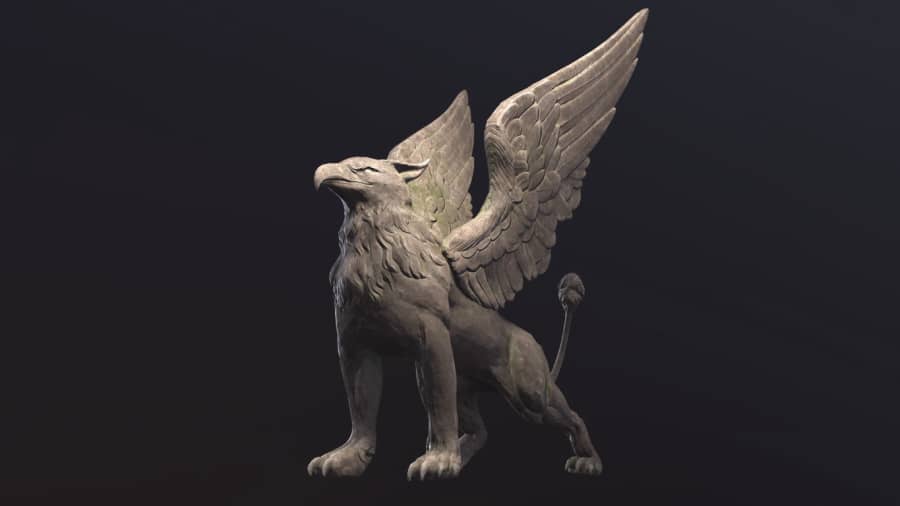
Regarding symbology, the griffin symbolizes royalty, immense power, and bravery, which has been depicted in history and stories as a powerful being. It is found in Greek mythology, which is often linked with Apollo, the sun God. Furthermore, they have been associated with vast collections of treasures and gold deposits.
The Winged Lion of Lamassu Legend
The Lamma in ancient Sumerian times was the goddess who, in later iterations, was used as the Lamassu symbol. Now in Sumerian traditions, the body of the winged lion is sometimes replaced with a bull along with the bird’s wings. The head here is sometimes a man’s or sometimes a bull’s.
In this representation of the winged lion, the symbolism represents power and intelligence, where the wings help the sun god control different aspects. If a human head is depicted on the statue, it will represent the creature’s intelligence. The wings depict the same idea in different cultures, such as immense association with gods and goddesses in various cultures.
4. What are Some Uses of the Lions Wings Statue?
In this article, we have already discussed winged lions. Furthermore, we also discussed what it symbolizes and some of its variations. Now let’s discuss some real-life uses of this lion with wings as a symbol.
Palacio de Velázquez in Madrid
In Madrid, the winged lions are present at the front entrance of Palacio de Velázquez, where they guard the place. Their wings are more stylized and have the head of a lion. The place is now converted into a museum, and the statues are maintained really well.
Winged Lion Memorial in Prague
These lions wings are more representative of an enormous eagle’s wings, but the body ultimately remains of a lion. It has been placed to commemorate the Royal Air Force airmen who fought during WW2. Standing on a plinth in the Winged Lion Memorial Palace, this statue holds the winged symbols pretty well.
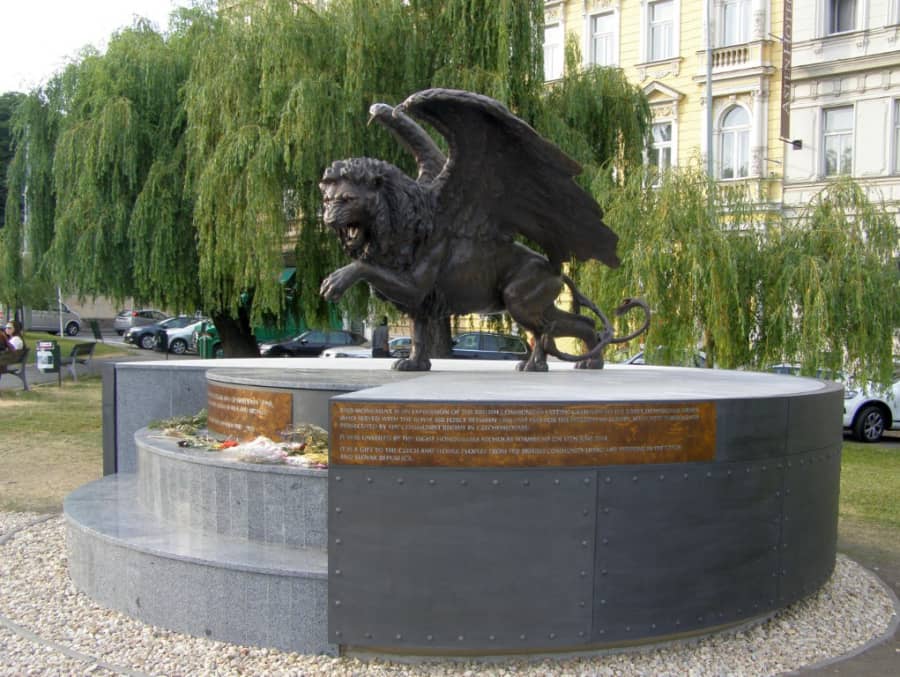
Lamassu at The Metropolitan Museum of Art
The human-headed winged lion is from the Mesopotamian region, from the Neo-Assyrian period of 883-859 BC. You can see this impressive statue in the Metropolitan Museum of Arts, NY city. It has been associated with the protective deity Lamassu, sometimes seen with a bull’s head.
Temple of the Winged Lions of Petra in Jordan
This lion with wings is thought to be originated from the Nabatean people in the same ancient temple where they worshiped their supreme goddess. Other than the head, half the body, and partial wings, the whole statue didn’t survive. Also, there isn’t much information in history about the actual purpose of the temple other than some worship speculations.
5. FAQs – Frequently Asked Questions about Winged Lions
When was the First Ever Winged Lion Statue Made in Our History?
When we look at history, the first recorded mention of a statue of lion wings is the Lion of Venice, sculptured long ago. Its history is sometimes so mythical that it enters the murky territory of something between a myth and a rumor.
But as mentioned in this article, the winged symbols we find in things from that era are probably inspired by the Piazza Marco dating back to the late 11th century.
Which Winged Lion Statue is the Most Famous?
The most well-known lions Wings statue has to be St. Mark’s primarily due to religious reasons, even though it holds different meanings in different religions. The 2nd closest statue signifying winged symbols is the lion of Lamassu, probably because of its association with a bull’s head on it instead of a lion’s.
Are the Winged Lion Statues Made of Stone?
In Greek architecture, you do see a lot of stone being used for sculptures as it was abundantly available and had many artisans for it at that time. Nonetheless, there have been many statues of lion with wings made of bronze, other metals, and sometimes resin. The choice of material depends on the craftsman, and in recent times, the quality and affordability of the material are the most critical factors.
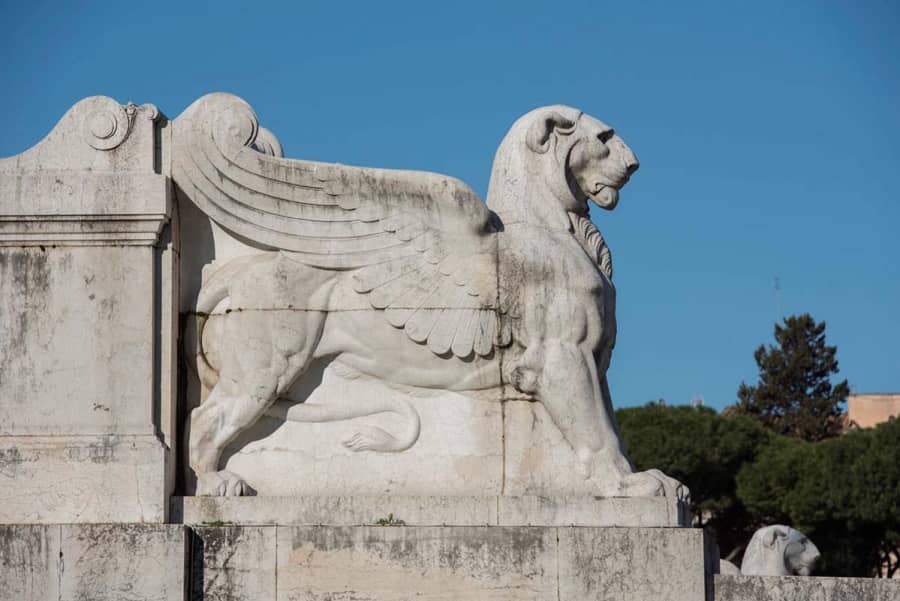
Do the Winged Lions Serve Some Practical Purpose Other Than Decoration?
While most sculptures and statues are made and erected for decorative purposes, some mythical ones are there for the sole purpose of association. Sometimes it can be myths and stories, while other times, it can be an avatar of a deity. Nonetheless, winged lions have primarily been associated with guardians of sacred spaces in ancient history.
6. Conclusion
Symbolism has excellent meaning in art and literature, and while in modern times, people have more sway, in ancient times, statues were more symbolic. They represented their connection with higher beings and many gods. They were the patrons of protection, strength, stability, and so much more.
In this article, we have discussed the winged lion, what its statues represented in older times, and what they signify. Hope you found it worth reading!


